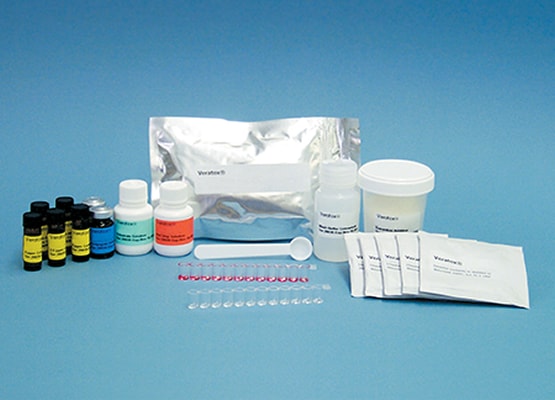
Veratox® for Hazelnut
Item No. 8420
- Accurate and easy-to-use
- Quantitate or screen samples
- High specificity

| Analyte | Hazelnut, Tree Nuts |
| Brand | Veratox® |
| Limit of Detection | <1 ppm hazelnut |
| Package Dimensions | 5.80 IN x 6.20 IN x 7.00 IN |
| Package Weight | 0.90 LB |
| Platform | ELISA |
| Prop 65 Warning | WARNING: This product can expose you to chemicals including thimerosal, which is known in the State of California to cause birth defects or other reproductive harm. For more information, go to www.P65Warnings.ca.gov. |
| Quantity per Package | 38 tests |
| Range of Quantitation | 2.50 ppm hazelnut - 25.00 ppm hazelnut |
| Result Type | Quantitative |
| Testing Time | 30.00 Minutes |
The Veratox for Hazelnut Allergen test is a sandwich enzyme-linked immunosorbent assay (S-ELISA). Hazelnut protein is extracted from samples with a phosphate buffered salt solution (PBS) by shaking in a heated water bath, followed by centrifugation or filtration. Extracted hazelnut protein is sampled and added to antibody-coated wells (capture antibody) where it binds to the antibody during an incubation. Any unbound hazelnut protein is washed away and a second antibody (detector antibody), which is enzyme labeled, is added. The detector antibody binds to the already bound hazelnut protein. After a second wash, substrate is added. Color develops as a result of the presence of bound detector antibody. Red Stop reagent is added and the color of the resulting solution is observed. The test is read in a microwell reader to yield optical densities. The optical densities of the controls form a standard curve, and the sample optical densities are plotted against the curve to calculate the exact concentration of hazelnut expressed as parts per million of hazelnut.
It represents world-leading brands and is the leading company for the technology needs of the Grain, Flour, Food, Feed industry.
Welcome to ABP WhatsApp Line ...
You can contact us and get information about our products and services...
